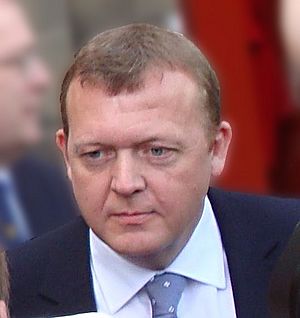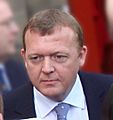Lars Løkke Rasmussen facts for kids
Quick facts for kids
Lars Løkke Rasmussen
|
|
|---|---|
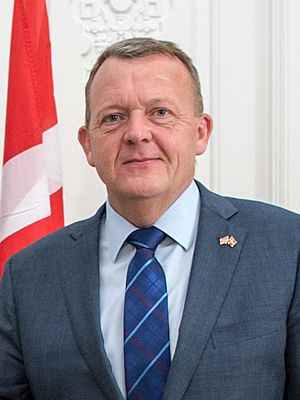
Rasmussen in 2017
|
|
| Minister of Foreign Affairs | |
| Assumed office 15 December 2022 |
|
| Prime Minister | Mette Frederiksen |
| Preceded by | Jeppe Kofod |
| Leader of the Moderates | |
| Assumed office 5 June 2022 |
|
| Preceded by | Party established |
| Prime Minister of Denmark | |
| In office 28 June 2015 – 27 June 2019 |
|
| Monarch | Margrethe II |
| Preceded by | Helle Thorning-Schmidt |
| Succeeded by | Mette Frederiksen |
| In office 5 April 2009 – 3 October 2011 |
|
| Monarch | Margrethe II |
| Deputy | Lene Espersen Lars Barfoed |
| Preceded by | Anders Fogh Rasmussen |
| Succeeded by | Helle Thorning-Schmidt |
| Leader of Venstre | |
| In office 17 May 2009 – 31 August 2019 |
|
| Preceded by | Anders Fogh Rasmussen |
| Succeeded by | Jakob Ellemann-Jensen |
| Minister of Finance | |
| In office 23 November 2007 – 7 April 2009 |
|
| Prime Minister | Anders Fogh Rasmussen |
| Preceded by | Thor Pedersen |
| Succeeded by | Claus Hjort Frederiksen |
| Minister of the Interior and Health | |
| In office 27 November 2001 – 23 November 2007 |
|
| Prime Minister | Anders Fogh Rasmussen |
| Preceded by | Karen Jespersen (Interior) Arne Rolighed (Health) |
| Succeeded by | Karen Jespersen (Social Welfare) Jakob Axel Nielsen (Health and Prevention) |
| Member of the Folketing | |
| Assumed office 21 September 1994 |
|
| Constituency | Zealand (from 2015) North Zealand (2007–2015) Frederiksborg (1994–2007) |
| Personal details | |
| Born | 15 May 1964 Vejle, Denmark |
| Political party | Moderates (2021–present) |
| Other political affiliations |
Venstre (1980–2021) |
| Spouse | Sólrun Jákupsdóttir |
| Children | 3, including Bergur Løkke Rasmussen |
| Alma mater | University of Copenhagen |
Lars Løkke Rasmussen (born 15 May 1964) is a Danish politician. He is currently the Minister of Foreign Affairs for Denmark, a role he has held since December 2022. Before this, he was the Prime Minister of Denmark twice: first from 2009 to 2011, and again from 2015 to 2019. He also led the Venstre political party for ten years, from 2009 to 2019.
Rasmussen has been a member of the Folketing (the Danish Parliament) since 1994. He also served as a County Mayor for Frederiksborg County from 1998 to 2001. He then became the Interior and Health Minister from 2001 to 2007. After that, he was the Minister of Finance from 2007 to 2009. In April 2009, he became Prime Minister after the previous Prime Minister, Anders Fogh Rasmussen, became the head of NATO.
In the 2011 election, his government lost its majority, and he stepped down as Prime Minister. He was replaced by Helle Thorning-Schmidt. However, in the 2015 election, his party and its allies won again, and he became Prime Minister for a second time. In 2019, after another election where his government was defeated, he resigned as Prime Minister. He later left the Venstre party and started a new party called the Moderates in 2021. This new party won 16 seats in the 2022 election.
Contents
Early Life and Education
Lars Løkke Rasmussen was born in Vejle, Denmark. His last name is Rasmussen, and Løkke is his middle name.
He finished high school in 1983. From 1986 to 1989, he was the leader of the youth group for the Venstre political party. He studied law at the University of Copenhagen and earned his law degree in 1992. Before becoming a full-time politician, he worked as a consultant from 1990 to 1995.
Lars Løkke Rasmussen is married to Sólrun Løkke Rasmussen. They have three children together.
Political Journey
Youth Leadership and Early Work
Lars Løkke Rasmussen was the chairman of the youth branch of the Venstre party from 1986 to 1989. During this time, he helped organize a fundraising campaign. This campaign raised money for school supplies in Afghanistan, which was occupied by the Soviet Union at the time. He even traveled to Afghanistan with a Danish group to deliver the funds.
County Mayor and Party Leadership
In 1998, Rasmussen was chosen as the deputy leader of the Venstre party. In the same year, he was elected as the county mayor of Frederiksborg County. He held this position until 2001, when he joined the national government.
Minister of the Interior and Health
From 2001 to 2007, Lars Løkke Rasmussen served as the Minister of the Interior and Health. In this role, he helped create an agreement in 2002 that allowed patients in public hospitals to choose a private hospital if they couldn't get treatment within two months. This time limit was later shortened to one month. He also worked on a reform that changed how money was shared between richer and poorer towns.
Changes to Local Government in 2007
As Minister of the Interior and Health, Lars Løkke Rasmussen led a big change in how Denmark's local governments were organized. This reform reduced the number of municipalities (local towns/cities) from 271 to 98. It also got rid of the 14 counties and replaced them with five larger regions.
Minister of Finance
After the Prime Minister, Anders Fogh Rasmussen, won re-election in 2007, Lars Løkke Rasmussen became the Minister of Finance. This was seen as a sign that he would likely become the next leader of the Venstre party and Prime Minister. As Finance Minister, he helped manage the government's response to the 2008 financial crisis, including providing funds to banks.
Tax Changes in 2009
In 2009, Lars Løkke Rasmussen was a key person in creating a major tax reform. This reform aimed to lower income taxes and increase taxes on things that cause pollution. He said it was the biggest reduction in income tax rates since 1903.
Becoming Prime Minister
On 4 April 2009, the leader of NATO stepped down, and Prime Minister Anders Fogh Rasmussen was chosen to take his place. Anders Fogh Rasmussen then announced he would resign as Prime Minister the next day. As the deputy leader of the largest party in the government, Lars Løkke Rasmussen became the new Prime Minister of Denmark on 5 April 2009.
Leading the COP15 Climate Conference
In December 2009, Lars Løkke Rasmussen led the COP15 in Copenhagen. This was a very important meeting where leaders from many countries discussed how to deal with climate change. Leading such a large international conference with many different opinions was a big challenge.
Government Spending Cuts
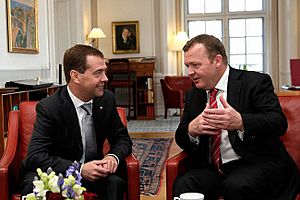
In May 2010, Rasmussen's government announced plans to reduce government spending and increase income. This included changes to unemployment benefits and foreign aid. These changes were made to save the government a lot of money.
2011 Election and Resignation
Rasmussen led his party, Venstre, in the September 2011 election. Although his party gained one seat, the other parties combined won more seats than his government. On 16 September 2011, Rasmussen officially resigned as Prime Minister to Queen Margrethe. He continued to lead the government temporarily until Helle Thorning-Schmidt was appointed as the new Prime Minister on 3 October 2011.
2015 Election and Return to Power
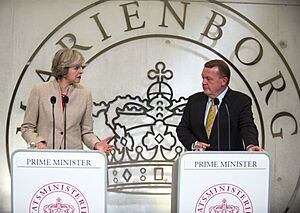
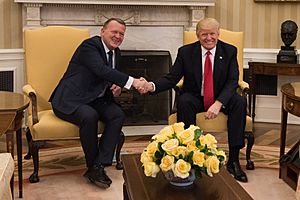
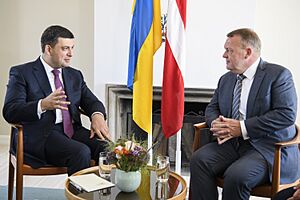
Lars Løkke Rasmussen led Venstre in the June 2015 election. His group of parties won the election, allowing him to form a new government. On 28 June 2015, he became Prime Minister again, leading a government made up only of members from his Venstre party. In November 2016, he expanded his government to include members from two other parties, the Liberal Alliance and the Conservative People's Party.
In 2015, when asked if Denmark was a socialist country, Rasmussen explained that Denmark has a market economy, which means businesses are mostly privately owned, even though the government provides many public services. In 2018, his government announced that Denmark would ban full-face veils.
After Being Prime Minister
2019 Election and Party Change
In the 2019 election, Rasmussen's party, Venstre, gained the most new votes. However, his allies lost a lot of support, meaning his government no longer had a majority. On election night, he accepted defeat to the "red bloc" led by Mette Frederiksen. He resigned as Prime Minister on 6 June 2019. He also resigned as the chairman of the Venstre party in August 2019 and left the party in January 2021.
Leader of the Moderates
In 2021, Rasmussen started a new political party called the Moderates. In the 2022 Danish general election, the Moderates became the third-largest party, winning 16 seats in Parliament. Rasmussen himself received many personal votes. After long talks about forming a new government, he was appointed as the Minister of Foreign Affairs in Mette Frederiksen's second government in December 2022.
Minister of Foreign Affairs
As Minister of Foreign Affairs, Rasmussen represents Denmark in international matters. In July 2024, he attended the NATO Summit in Washington, D.C., where he met with other foreign ministers to discuss global issues. In late October 2024, he and other Nordic foreign ministers signed a letter against a proposed bill in Israel that would affect a UN agency working in Palestinian areas. In June 2025, after some events involving the United States and Iran, Rasmussen stated that Iran should not develop nuclear weapons and urged all sides to talk to avoid further problems.
Personal Life
Lars Løkke Rasmussen's son, Bergur Løkke Rasmussen, has been a member of the European Parliament since 2022.
Awards and Honours
Danish Honours
International Honours
 Belgium: Grand Cross of the Order of the Crown (2017)
Belgium: Grand Cross of the Order of the Crown (2017) France: Grand Cross of the National Order of Merit (2018)
France: Grand Cross of the National Order of Merit (2018) Greece: Grand Cross of the Order of the Phoenix (2009)
Greece: Grand Cross of the Order of the Phoenix (2009) Iceland: Grand Cross of the Order of the Falcon (2017)
Iceland: Grand Cross of the Order of the Falcon (2017) Mexico: Sash of Special Category of the Order of the Aztec Eagle (2016)
Mexico: Sash of Special Category of the Order of the Aztec Eagle (2016) South Korea: Grand Gwanghwa Medal of the Order of Diplomatic Service (2011)
South Korea: Grand Gwanghwa Medal of the Order of Diplomatic Service (2011)
Images for kids
See also
 In Spanish: Lars Løkke Rasmussen para niños
In Spanish: Lars Løkke Rasmussen para niños


